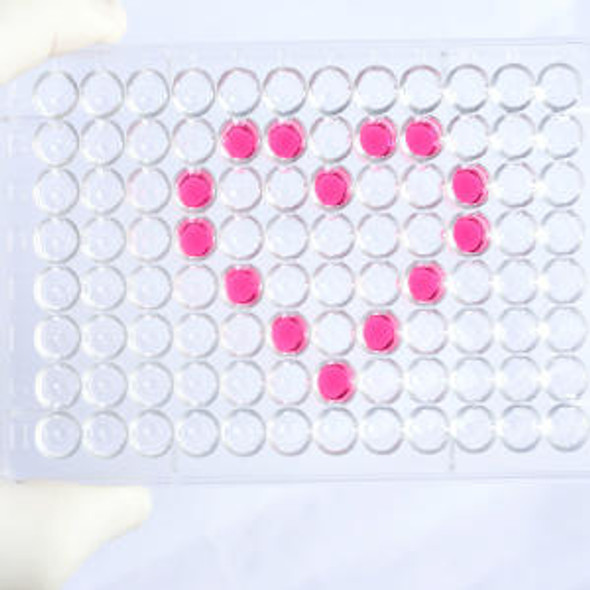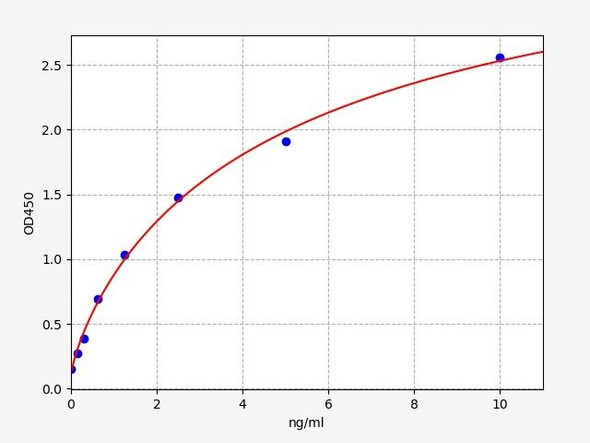Mouse Eef2k / Eukaryotic elongation factor 2 kinase ELISA Kit
- SKU:
- MOFI00355
- Product Type:
- ELISA Kit
- Size:
- 96 Assays
- Uniprot:
- O08796
- Sensitivity:
- 0.094ng/ml
- Range:
- 0.156-10ng/ml
- ELISA Type:
- Sandwich ELISA, Double Antibody
- Synonyms:
- Eef2k, Eukaryotic elongation factor 2 kinase, eEF-2 kinase, eEF-2K, Calcium, calmodulin-dependent eukaryotic elongation factor 2 kinase
- Reactivity:
- Mouse
Description
| Product Name: | Mouse Eef2k / Eukaryotic elongation factor 2 kinase ELISA Kit |
| Product Code: | MOFI00355 |
| Size: | 96 Assays |
| Alias: | Eef2k, Eukaryotic elongation factor 2 kinase, eEF-2 kinase, eEF-2K, Calcium, calmodulin-dependent eukaryotic elongation factor 2 kinase |
| Detection Method: | Sandwich ELISA |
| Application: | This immunoassay kit allows for the in vitro quantitative determination of Mouse Eef2k concentrations in serum plasma and other biological fluids. |
| Sensitivity: | 0.094ng/ml |
| Range: | 0.156-10ng/ml |
| Storage: | 4°C for 6 months |
| Note: | For Research Use Only |
| Recovery: | Matrices listed below were spiked with certain level of Mouse Eef2k and the recovery rates were calculated by comparing the measured value to the expected amount of Mouse Eef2k in samples. | ||||||||||||||||
| |||||||||||||||||
| Linearity: | The linearity of the kit was assayed by testing samples spiked with appropriate concentration of Mouse Eef2k and their serial dilutions. The results were demonstrated by the percentage of calculated concentration to the expected. | ||||||||||||||||
| |||||||||||||||||
| Intra Assay: | CV <8% | ||||||||||||||||
| Inter Assay: | CV <10% |
| Component | Quantity | Storage |
| ELISA Microplate (Dismountable) | 8-12 strips | 4°C for 6 months |
| Lyophilized Standard | 2 | 4°C/-20°C |
| Sample/Standard Dilution Buffer | 20ml | 4°C |
| Biotin-labeled Antibody(Concentrated) | 120ul | 4°C (Protect from light) |
| Antibody Dilution Buffer | 10ml | 4°C |
| HRP-Streptavidin Conjugate(SABC) | 120ul | 4°C (Protect from light) |
| SABC Dilution Buffer | 10ml | 4°C |
| TMB Substrate | 10ml | 4°C (Protect from light) |
| Stop Solution | 10ml | 4°C |
| Wash Buffer(25X) | 30ml | 4°C |
| Plate Sealer | 5 | - |
Other materials and equipment required:
- Microplate reader with 450 nm wavelength filter
- Multichannel Pipette, Pipette, microcentrifuge tubes and disposable pipette tips
- Incubator
- Deionized or distilled water
- Absorbent paper
- Buffer resevoir
| Uniprot | O08796 |
| UniProt Protein Function: | EEF2K: an atypical protein kinase of the Alpha family. Dependent on Ca2 ions and calmodulin. May play a key role linking cellular energy status and the inhibition of protein synthesis, a major consumer of metabolic energy. Phosphorylates and inactivates eEF2, resulting in the inhibition of peptide-chain elongation eEF2K is phosphorylated and activated by AMPK in response to elevated AMP levels, which increase during cellular stress and starvation. Regulated in response to a range of stimuli including TNF-alpha. Overexpressed in breast cancer cell lines and tumors. Activated in rat glioblastoma, and growth was inhibited by the drug Rottlerin. Activity induced in ischemic heart muscle |
| UniProt Protein Details: | Protein type:EC 2.7.11.20; Kinase, protein; Protein kinase, Ser/Thr (non-receptor); Protein kinase, atypical; Translation; ATYPICAL group; Alpha family; eEF2K subfamily Cellular Component: postsynaptic density Molecular Function:calmodulin binding; elongation factor-2 kinase activity; translation factor activity, nucleic acid binding Biological Process: negative regulation of apoptosis; positive regulation of endocytosis; positive regulation of synaptogenesis; protein amino acid autophosphorylation; regulation of protein amino acid autophosphorylation; translational elongation |
| UniProt Code: | O08796 |
| NCBI GenInfo Identifier: | 3334172 |
| NCBI Gene ID: | 13631 |
| NCBI Accession: | O08796.1 |
| UniProt Related Accession: | O08796 |
| Molecular Weight: | 81,739 Da |
| NCBI Full Name: | Eukaryotic elongation factor 2 kinase |
| NCBI Synonym Full Names: | eukaryotic elongation factor-2 kinase |
| NCBI Official Symbol: | Eef2k |
| NCBI Official Synonym Symbols: | C86191; eEF-2K |
| NCBI Protein Information: | eukaryotic elongation factor 2 kinase |
| UniProt Protein Name: | Eukaryotic elongation factor 2 kinase |
| UniProt Synonym Protein Names: | Calcium/calmodulin-dependent eukaryotic elongation factor 2 kinase |
| Protein Family: | Eukaryotic elongation factor 2 kinase |
| UniProt Gene Name: | Eef2k |
| UniProt Entry Name: | EF2K_MOUSE |
*Note: Protocols are specific to each batch/lot. For the correct instructions please follow the protocol included in your kit.
| Step | Procedure |
| 1. | Set standard, test sample and control (zero) wells on the pre-coated plate respectively, and then, record their positions. It is recommended to measure each standard and sample in duplicate. Wash plate 2 times before adding standard, sample and control (zero) wells! |
| 2. | Aliquot 0.1ml standard solutions into the standard wells. |
| 3. | Add 0.1 ml of Sample / Standard dilution buffer into the control (zero) well. |
| 4. | Add 0.1 ml of properly diluted sample (Human serum, plasma, tissue homogenates and other biological fluids.) into test sample wells. |
| 5. | Seal the plate with a cover and incubate at 37 °C for 90 min. |
| 6. | Remove the cover and discard the plate content, clap the plate on the absorbent filter papers or other absorbent material. Do NOT let the wells completely dry at any time. Wash plate X2. |
| 7. | Add 0.1 ml of Biotin- detection antibody working solution into the above wells (standard, test sample & zero wells). Add the solution at the bottom of each well without touching the side wall. |
| 8. | Seal the plate with a cover and incubate at 37°C for 60 min. |
| 9. | Remove the cover, and wash plate 3 times with Wash buffer. Let wash buffer rest in wells for 1 min between each wash. |
| 10. | Add 0.1 ml of SABC working solution into each well, cover the plate and incubate at 37°C for 30 min. |
| 11. | Remove the cover and wash plate 5 times with Wash buffer, and each time let the wash buffer stay in the wells for 1-2 min. |
| 12. | Add 90 µL of TMB substrate into each well, cover the plate and incubate at 37°C in dark within 10-20 min. (Note: This incubation time is for reference use only, the optimal time should be determined by end user.) And the shades of blue can be seen in the first 3-4 wells (with most concentrated standard solutions), the other wells show no obvious color. |
| 13. | Add 50 µL of Stop solution into each well and mix thoroughly. The color changes into yellow immediately. |
| 14. | Read the O.D. absorbance at 450 nm in a microplate reader immediately after adding the stop solution. |
When carrying out an ELISA assay it is important to prepare your samples in order to achieve the best possible results. Below we have a list of procedures for the preparation of samples for different sample types.
| Sample Type | Protocol |
| Serum: | If using serum separator tubes, allow samples to clot for 30 minutes at room temperature. Centrifuge for 10 minutes at 1,000x g. Collect the serum fraction and assay promptly or aliquot and store the samples at -80°C. Avoid multiple freeze-thaw cycles. If serum separator tubes are not being used, allow samples to clot overnight at 2-8°C. Centrifuge for 10 minutes at 1,000x g. Remove serum and assay promptly or aliquot and store the samples at -80°C. Avoid multiple freeze-thaw cycles. |
| Plasma: | Collect plasma using EDTA or heparin as an anticoagulant. Centrifuge samples at 4°C for 15 mins at 1000 - g within 30 mins of collection. Collect the plasma fraction and assay promptly or aliquot and store the samples at -80°C. Avoid multiple freeze-thaw cycles. Note: Over haemolysed samples are not suitable for use with this kit. |
| Urine & Cerebrospinal Fluid: | Collect the urine (mid-stream) in a sterile container, centrifuge for 20 mins at 2000-3000 rpm. Remove supernatant and assay immediately. If any precipitation is detected, repeat the centrifugation step. A similar protocol can be used for cerebrospinal fluid. |
| Cell culture supernatant: | Collect the cell culture media by pipette, followed by centrifugation at 4°C for 20 mins at 1500 rpm. Collect the clear supernatant and assay immediately. |
| Cell lysates: | Solubilize cells in lysis buffer and allow to sit on ice for 30 minutes. Centrifuge tubes at 14,000 x g for 5 minutes to remove insoluble material. Aliquot the supernatant into a new tube and discard the remaining whole cell extract. Quantify total protein concentration using a total protein assay. Assay immediately or aliquot and store at ≤ -20°C. |
| Tissue homogenates: | The preparation of tissue homogenates will vary depending upon tissue type. Rinse tissue with 1X PBS to remove excess blood & homogenize in 20ml of 1X PBS (including protease inhibitors) and store overnight at ≤ -20°C. Two freeze-thaw cycles are required to break the cell membranes. To further disrupt the cell membranes you can sonicate the samples. Centrifuge homogenates for 5 mins at 5000xg. Remove the supernatant and assay immediately or aliquot and store at -20°C or -80°C. |
| Tissue lysates: | Rinse tissue with PBS, cut into 1-2 mm pieces, and homogenize with a tissue homogenizer in PBS. Add an equal volume of RIPA buffer containing protease inhibitors and lyse tissues at room temperature for 30 minutes with gentle agitation. Centrifuge to remove debris. Quantify total protein concentration using a total protein assay. Assay immediately or aliquot and store at ≤ -20 °C. |
| Breast Milk: | Collect milk samples and centrifuge at 10,000 x g for 60 min at 4°C. Aliquot the supernatant and assay. For long term use, store samples at -80°C. Minimize freeze/thaw cycles. |










